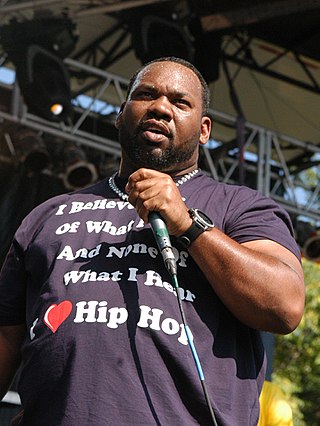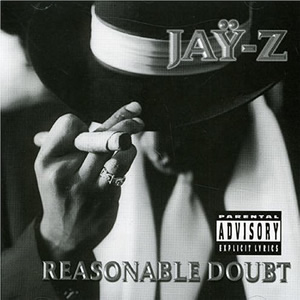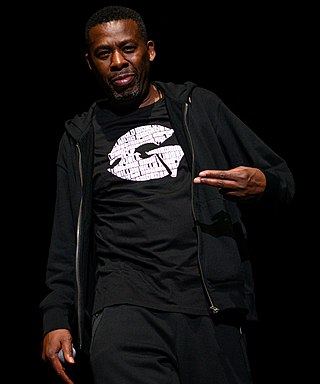Brother J | |
|---|---|
| Birth name | Jason Hunter |
| Also known as | Grand Verbalizer Funkin' Lesson Brother J, Leader Brother J |
| Origin | Brooklyn, New York, United States |
| Genres | Hip hop |
| Occupation | Rapper |
| Years active | 1989-1995 2006-present |
| Labels | 4th & B'way/Island/PolyGram Records Suburban Noize Records |
Jason Hunter, better known by his stage name Brother J, is an American hip hop artist and is a member of the American hip hop group X Clan, which used to include Professor X the Overseer, Paradise the Architect, and Sugar Shaft. He shares the same first and last name with Inspectah Deck of the Wu-Tang Clan.
In 2016, Design & Trend magazine named him as one of the 10 Greatest Conscious Rappers of All Time. [1]

Wu-Tang Clan is an American hip hop musical collective formed in Staten Island, New York City, in 1992. Its members include RZA, GZA, Method Man, Raekwon, Ghostface Killah, Inspectah Deck, U-God, Masta Killa, and, until his death in 2004, Ol' Dirty Bastard. Close affiliate Cappadonna later became an official member. They are credited for revitalizing East Coast hip hop and are considered one of the greatest hip hop groups of all time.

Lana Michele Moorer, better known by her stage name MC Lyte, is an American rapper. Considered one of the pioneers of female rap, MC Lyte first gained fame in the late 1980s, becoming the first female rapper to release a full solo album with 1988's critically acclaimed Lyte as a Rock. The album spawned the singles "10% Dis" and "Paper Thin".

Corey Woods, better known by his stage name Raekwon, is an American rapper. He rose to prominence as a founding member of the hip-hop group Wu-Tang Clan, which achieved mainstream success following the release of their debut album, Enter the Wu-Tang , in 1993. Raekwon would subsequently pursue a solo career, releasing his first solo album, entitled Only Built 4 Cuban Linx..., in 1995. The album received critical acclaim, and is regarded by many critics as one of the greatest hip-hop albums of all time, as well as a staple of 1990s rap.

Enter the Wu-Tang is the debut studio album by the American hip-hop group Wu-Tang Clan, released on November 9, 1993, by Loud Records and RCA Records. The recording sessions took place during late 1992 to early 1993 at Firehouse Studio in New York City, and the album was produced by the group's de facto leader RZA. Its title originates from the martial arts films Enter the Dragon (1973) and The 36th Chamber of Shaolin (1978).

Reasonable Doubt is the debut studio album by American rapper Jay-Z. It was released on June 25, 1996, by his own record label Roc-A-Fella Records and distributed by Priority Records. The album features production provided by DJ Premier, Ski, Knobody and Clark Kent, and also includes guest appearances from Memphis Bleek, Mary J. Blige, Jaz-O, and the Notorious B.I.G., among others. The album features mafioso rap themes and gritty lyrics about the "hustler" lifestyle and material obsessions.

William Michael Griffin Jr., better known by his stage name Rakim, is an American rapper. He is one half of golden age hip hop duo Eric B. & Rakim, with whom he released four albums: Paid in Full (1987), Follow the Leader (1988), Let the Rhythm Hit 'Em (1990), and Don't Sweat the Technique (1992). He also released four solo albums: The 18th Letter (1997), The Master (1999), The Seventh Seal (2009), and G.O.D.'s Network: Reb7rth (2024).
Underground hip-hop is an umbrella term for hip hop music that is outside the general commercial canon. It is typically associated with independent artists, signed to independent labels or no label at all. Underground hip hop is often characterized by socially conscious, positive, or anti-commercial lyrics. However, there is no unifying or universal theme – AllMusic suggests that it "has no sonic signifiers". "The Underground" also refers to the community of musicians, fans and others that support non-commercial, or independent music. Music scenes with strong ties to underground hip hop include alternative hip hop and conscious hip hop. Many artists who are considered "underground" today were not always so, and may have previously broken the Billboard charts.

Hip-hop fashion refers to the various styles of dress that originated from Urban Black America and inner city youth in cities like New York City, Atlanta, and Los Angeles. Being a major part of hip hop culture, it further developed in other cities across the United States, with each contributing different elements to the overall style that is now recognized worldwide.

Antonio Hardy, better known by his stage name Big Daddy Kane, is an American rapper, producer and actor who began his career in 1986 as a member of the Juice Crew. He is widely regarded as one of the most influential and skilled MCs in hip hop. Rolling Stone ranked his song "Ain't No Half-Steppin'" number 25 on its list of The 50 Greatest Hip-Hop Songs of All Time, calling him "a master wordsmith of rap's late-golden age and a huge influence on a generation of MCs".

Rap rock is a music genre that developed from the early to mid-1980s, when hip hop DJs incorporated rock records into their routines and rappers began incorporating original and sampled rock instrumentation into hip hop music. Rap rock is considered to be rock music in which lyrics are rapped, rather than sung. The genre achieved its greatest success in the late 1990s and early 2000s.
Tanzanian Hip-hop, which is sometimes referred to Bongo Flava by many outside of Tanzania's hip hop community, encompasses a large variety of different sounds, but it is particularly known for heavy synth riffs and an incorporation of Tanzanian pop.
Zimbabwean hip hop is a variety of hip hop music that is popular in Zimbabwe. It emerged in the early 1990s. Prominent artists include Young Gemini,Noluntu J, Voltz JT ,Br3eze, Ti Gonzi, Junior Brown, Calvin, Saintfloew, Holy Ten, Mahcoy, Trey Heart, Asaph, Kriss Newtone, Suhn, Cyprian, Grade 1B Hichwii,Denim Woods, Hanna, Tanto Wavie, Tehn Diamond, Synik, Joie LeFeu, Hurrikane, Maskiri, T3rry Tempo, TreyXL, Munetsi, Bling4, Tha Bees, Bagga We Ragga and Raykaz.

Grandmaster Flash and the Furious Five were an American hip hop group formed in the South Bronx of New York City in 1978. The group's members were Grandmaster Flash, Kidd Creole, Keef Cowboy, Melle Mel, Scorpio, and Rahiem. The group's use of turntablism, breakbeat DJing, and conscious lyricism were significant in the early development of hip hop music.

Mobb Deep was an American hip hop duo from Queens, New York formed in 1991. Consisting of rappers/songwriters/record producers Prodigy and Havoc, they are considered to be among the principal progenitors of hardcore East Coast hip hop. Mobb Deep became one of the most successful rap duos of all time, having sold over three million records. Their best-known albums are The Infamous (1995), Hell on Earth (1996) and Murda Muzik (1999), and their most successful singles were "Shook Ones " and "Survival of the Fittest." They were known for their dark and hardcore delivery.

"C.R.E.A.M." is a song by the American hardcore hip hop group Wu-Tang Clan, released on January 31, 1994 by Loud Records, as the second single from their debut studio album Enter the Wu-Tang (1993). The song was produced by the group's de facto leader RZA, and contains a sample of the Charmels' 1967 song "As Long As I've Got You" throughout. It features two verses from members Raekwon and Inspectah Deck, who discuss their upbringings while living in New York City, and Method Man, who sings its hook. Its music video, featuring all Wu-Tang Clan members in New York City, was released in 1994.

Political hip hop is a subgenre of hip hop music that was developed in the 1980s as a way of turning hip hop into a form of political activism. Political hip hop generally uses the medium of hip hop music to comment on sociopolitical issues and send political messages to inspire action, create social change, or to convince the listener of a particular worldview. It was inspired partially by politically-focused 1970s artists such as The Last Poets and Gil Scott-Heron, as well as the Black Power movement, Black Panther Party and revolutionary politics of the 1960s and 1970s. Various hip hop artists emerged in the late 1980s espousing political messages and providing social and political commentary with KRS-One and his group Boogie Down Productions, and Public Enemy in particular establishing themselves as some of the first predominantly political hip hop groups with albums in 1988. Soon to follow in 1989 and following years were other political rappers, or known as "Conscious rap" including such groups as X-Clan, Poor Righteous Teachers, Paris (rapper), Disposable Heroes of Hiphoprisy and others. The genre has helped to create a new form of social expression for subordinate groups to speak about their exclusions, injustices, and lack of power.
Hip hop or hip-hop, also known as rap and formerly as disco rap, is a genre of popular music that originated in the early 1970s from the African American community. Hip-hop music originated as an anti-drug and anti-violence genre consisting of stylized rhythmic music that often accompanies rapping, a rhythmic delivery of poetic speech. In the early 1990s, a professor of African American studies at Temple University said, "Hip-hop is something that blacks can unequivocally claim as their own." By the 21st century, the field of rappers had diversified by both race and gender. The music developed as part of the broader hip-hop culture, a subculture defined by four key stylistic elements: MCing/rapping, DJing/scratching with turntables, breakdancing, and graffiti art. While often used to refer solely to rapping and rap music, "hip hop" more properly denotes the practice of the entire subculture. The term hip hop music is sometimes used synonymously with the term rap music, though rapping is not a required component of hip hop music; the genre may also incorporate other elements of the culture, including DJing, turntablism, scratching, beatboxing, and instrumental tracks.

Kendrick Lamar Duckworth is an American rapper and songwriter. Regarded as one of the most influential hip hop artists of his generation, and one of the greatest rappers of all time, he is known for his technical artistry and complex songwriting. He was awarded the 2018 Pulitzer Prize for Music, becoming the first musician outside of the classical and jazz genres to be honored.

Prisoner of Conscious is the fifth solo studio album by American rapper Talib Kweli. The album was released on May 7, 2013. The album features guest appearances from Nelly, Miguel, Currensy, Kendrick Lamar, Marsha Ambrosius, Busta Rhymes and Ryan Leslie along with production by RZA, Boi-1da, Harry Fraud, S1, Terrace Martin, Oh No, and J. Cole among others.

Gary Eldridge Grice, better known by his stage names GZA and The Genius, is an American rapper. A founding member of the hip hop group Wu-Tang Clan, GZA is the group's "spiritual head", being both the first member in the group to receive a record deal and being the oldest member. He has appeared on his fellow Wu-Tang members' solo projects, and has maintained a successful solo career starting with his second album Liquid Swords (1995).